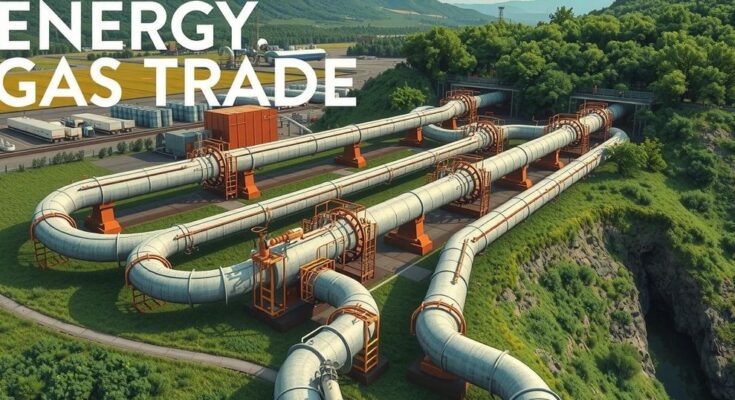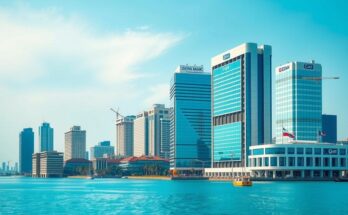Argentina has started exporting natural gas to Brazil through Bolivia for the first time, utilizing the YPFB infrastructure. This initiative follows a trilateral agreement and aims to meet Brazil’s industrial energy demands while stabilizing Bolivia’s fuel supply. YPFB has denied allegations about mismanagement and emphasized transparency in fuel pricing.
Argentina has commenced its inaugural export of natural gas to Brazil through a collaborative framework with Yacimientos Petrolíferos Fiscales Bolivianos (YPFB). The gas is sourced from the Vaca Muerta field in Neuquén and is transported via Argentina’s TGN and TGS pipelines to Salta, subsequently utilizing Bolivia’s YPFB network, including the Madrejones pipeline, to reach Brazil. This initiative follows a trilateral agreement finalized in late 2024.
The Brazil-Bolivia Gas Pipeline, referred to as Gasbol, currently possesses a daily capacity of 30 million cubic meters but operates at only 10 million cubic meters. Bolivian authorities indicated plans to enhance capacity over the next five years to fulfill Brazil’s rising industrial demands. This strategy is a shift for Bolivia, transitioning from energy exports to leasing its pipeline infrastructure, thereby boosting revenue and strengthening its position as a pivotal energy conduit in the region.
As part of this arrangement, Argentina’s energy sector is poised for revitalization, paving the way for future hydrocarbon investments. Initial gas shipments are projected at 2 million cubic meters daily. Meanwhile, YPFB’s president, Armin Dorgathen, announced the stabilization of fuel supply across Bolivia’s major cities, including Santa Cruz, La Paz, and Cochabamba, thereby alleviating fuel shortages.
YPFB is reported to distribute over 7.7 million liters of diesel and 8 million liters of gasoline daily, with additional shipments arriving at Chile’s port of Arica. Dorgathen refuted allegations regarding fleeing Bolivia or inflating fuel prices, asserting that the costs are consistent with global standards and defending the country’s fuel subsidy policy.
He remarked that the gas previously directed towards Argentina is now redirected to Brazil, where demand is significantly higher. He confirmed that fuel supply has been normalized in Bolivia’s main urban areas, remarking, “In Santa Cruz and La Paz, the queues to fill up gasoline have practically disappeared, which shows that we are managing to stabilize the supply.”
Additionally, Dorgathen announced the arrival of two extra ships at Arica, with a total of five ships prepared for unloading. He dismissed rumors of his departure from Bolivia as false, asserting, “We continue working in Bolivia,” aiming to provide transparent information about imports and fuel pricing in regional markets.
Argentina’s initiation of natural gas exports to Brazil via Bolivia represents a significant regional energy partnership, enhancing Bolivia’s role as an energy transit nation while revitalizing Argentina’s energy sector. Amid efforts to stabilize fuel supply in Bolivia, YPFB is focused on maintaining transparency regarding fuel pricing amidst rumors and addressing increasing demands from Brazil. This strategic collaboration anticipates future investments in hydrocarbon resources.
Original Source: en.mercopress.com




